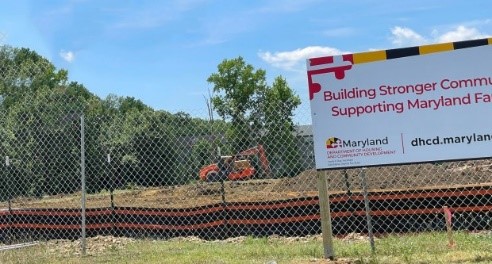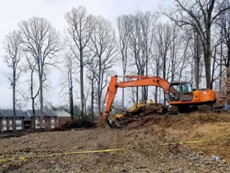GERALD WINEGRAD: LARRY HOGAN’S SELF-DEALING AND ANTI-ENVIRONMENTAL REGIME | COMMENTARY

HOGAN bought this 2.73-acre Annapolis site for $585,000 and sold it unimproved for $2.1 million after Gov. Hogan approved a $1.5 million low-income housing tax credit for The Willows, enriching himself. (Carol Swan/Courtesy)
In a January 2020 column in the New Republic, the headline blared: “The Most Popular Crook in America: The Ominous Approval Ratings of Larry Hogan, the Corrupt Republican Governor of Maryland.” This was based on a lengthy investigative report by Eric Cortellessa, then a journalist for Washington Monthly. He documented how Hogan repeatedly steered state transportation development money to projects that would increase the value of his real estate holdings.
Last month, Time magazine published a new investigative report headlined: “Larry Hogan Approved Millions for His Firm’s Listed Clients as Governor.” The report was by Cortellessa, now a national political correspondent for Time. He documents Hogan’s self-enrichment as governor in approving competitive state financial incentives for his company’s clients for moderate-income housing. The report also covers Hogan’s profiting from transportation projects he approved benefiting his company’s holdings in real estate.
Cortellessa notes how Hogan failed to recuse himself on approvals of these subsidies and projects as required.
Hogan’s eponymously named HOGAN is an amalgam of speculative real estate companies whereby the levers of state and local government are manipulated to gain permits and, in some cases, governmental subsidies and transit improvements. HOGAN then sells the land at a greatly increased value to be developed. Hogan receives a percentage of the profits from each deal.
A limited liability company is created for each property and given an innocuous name hiding its location. Only a resident agent, usually a lawyer, is listed for the LLC. A Baltimore Sun story from May 2019 noted that Hogan had a financial interest in 43 LLCs, many of these land deals purchased since he was elected governor. HOGAN also acts as consultants for land developers in gaining permits and subsidies.
When running for reelection in 2018, Hogan revealed he made $2.4 million during his first three years in office from undisclosed sources. He refused to reveal his income sources since then.
In a January 23, 2014, Daily Record op-ed, C. Fraser Smith detailed how Hogan, in deciding to run for governor for the first time “talked about running as a way to advertise his business.” Hogan’s admission that running was a good way to promote his real estate business came against strong odds of defeating then-Democratic Lieutenant Governor Anthony Brown.
Hogan still portrays himself as a small business owner. But HOGAN enterprises reported more than $2.5 billion in real estate deals since 1985. His enterprises are still touting their ability to grease the skids for government approvals and entitlements. HOGAN’s website claims: “If you want to determine the best strategy for taking your property through the governmental entitlement process as well as achieve the best development potential and highest return on your investment, you only need to turn to HOGAN.”
As governor, Hogan refused to put his holdings into a blind trust, and after nearly a year of wrangling with the Maryland State Ethics Commission, simply turned over operations to his brother while maintaining his financial interests in holdings. He maintained his access to his company’s holdings and continued to receive payments from profits.
In my environmental advocacy and writings, I ran into repeated examples of Hogan’s corrupt practices that go well beyond Cortellessa’s reporting. It started on his first day as governor in 2015 when he killed a long-waited regulation from Martin O’Malley’s administration preventing the dumping of chicken manure on lands already saturated with phosphorus, a major bay pollutant.
Hogan had pleaded for funds in his campaign’s last months for costly TV ads. The owner of Mountaire, one of the largest poultry companies, donated $250,000 to the Republican Governors Association, which escaped state campaign donations finance restrictions and was used for the TV ads.
Mountaire’s Delaware chicken waste processing facility was badly polluting the ground and surface waters sickening folks. After a four-year court battle, Mountaire agreed in 2021 to pay $65 million to affected residents and $120 million to upgrade its facilities. An NGO’s 2021 investigation termed “Blind Eye to Big Chicken” documented the complete failure of the Hogan administration to enforce regulation of millions of pounds of chicken excrement dumped on farm fields, including Mountaire’s contractors.
In fighting development of the 176-acre Crystal Spring site in Annapolis, I incidentally found repeated cases of HOGAN speculation and consultancy in real estate parcels. As governor, his decisions directly benefited him financially. One such project is now under construction as The Willows directly next to Crystal Spring.
HOGAN bought this 2.7-acre Annapolis site for $585,000 and sold it unimproved for $2.1 million after Hogan in 2021 wrongfully approved a $1.5 million low-income housing tax credit (LIHTC) for the development, enriching himself. This aid to move the 58-apartment project forward was one of 18 applications chosen out of 49 received. The property was sold on May 9, 2024, and it’s unknown how much profit Hogan personally reaped from the sale. The state property assessment before the sale valued the property at $241,500.
Cortellessa’s investigative reporting in Time notes that a senior Department of Housing and Community Development official stated, “Ultimately the governor can say, ‘Yay or Nay’” on these competitive awards. Cortellessa found that before Hogan became governor, in 2011 and 2012, HOGAN’s listed companies won 0% and 30%, respectively, of such competitive LIHTC awards; when Hogan’s first awards were announced in January 2016, HOGAN’s listed clients won 47% of all LIHTCs and state funds.
There are many other HOGAN projects in Anne Arundel County.
Disturbingly, the Hogan administration blocked the passage of the City of Annapolis’ seminal no-net loss of forest law which requires replanting all forest cleared by land development. This was despite the Maryland attorney general’s opinion that they lacked legal authority to do so. The state legislature enacted legislation to reverse this blockage of tighter forest protections. Annapolis then enacted its tough law.

The Hogan administration wrongfully blocked a strict no net loss of forest law until the legislature intervened. Now, 27 forest acres to be cleared at Crystal Spring will be replanted on site. Under Hogan, none would be. (Carol Swan/Courtesy)
His administration emaciated enforcement of environmental laws to a 20-year low, cutting enforcement personnel and rendering laws dealing with land development largely unenforced. Hogan reversed requirements for new septic tanks outside the Critical Area to remove higher levels of nitrogen. This facilitated developments with cheaper, more polluting septic systems.
Hogan blocked reappointment of members of the Patuxent River Commission who opposed developments, including the Patuxent Riverkeeper. Legislation forced the latter’s reappointment, which became law without his signature.
His self-enriching deals triggered introduction of new ethics legislation after the government watchdog group Public Citizen filed an ethics complaint in February 2020. Shortly thereafter, HOGAN deleted from its website its entire client list. A year later, the legislature unanimously passed legislation enhancing disclosure requirements for public officials. Hogan quietly let the bill become law without his signature. It went into effect after he left office.
These are but a few of the land deals and anti-environmental actions perpetrated by Hogan. Cortellessa has documented many more. As governor, Hogan would do nothing to impede land development.
On a recent financial disclosure form he reported a net worth between $12.3 and $35 million. And while governor in 2021, he purchased a $1.1 million five-bedroom mansion on six acres in Davidsonville. This is a striking financial turnaround as Hogan was forced to file for bankruptcy in April 1994 when lenders called in his loans, and he liquidated his real-estate business and his $750,000 home in Upper Marlboro.
Hogan was right: running for governor did greatly advance his financial interests, likely much more than he thought.
Gerald Winegrad represented the greater Annapolis area as a Democrat in the Maryland House of Delegates and Senate for 16 years. Contact him at gwwabc@comcast.net.